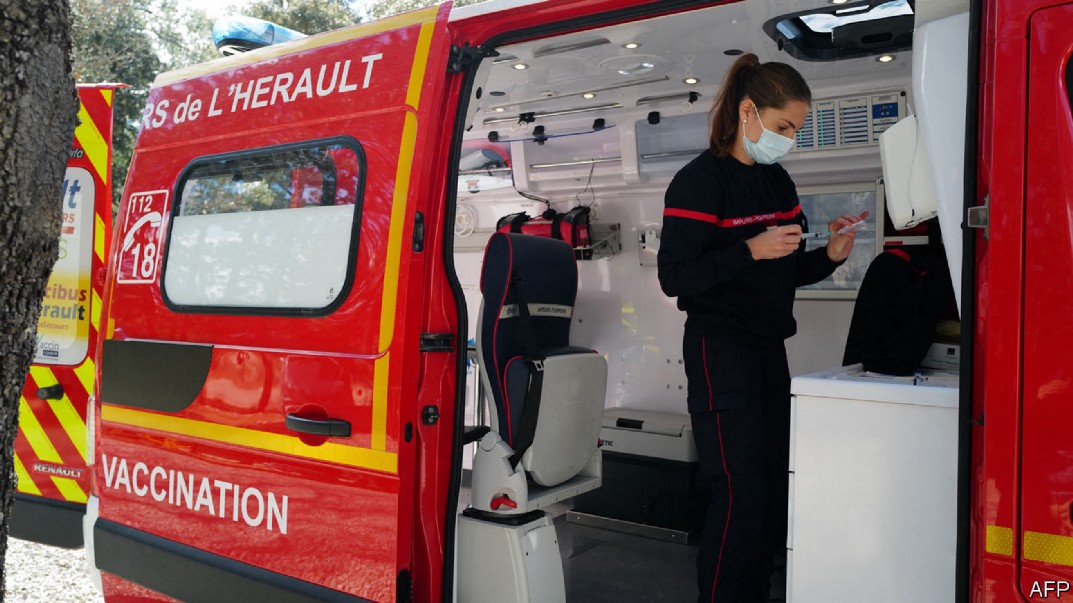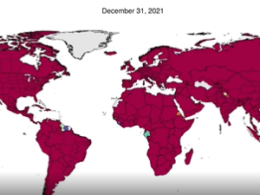Governments scramble to stop the new variant
The Economist
Dec 19th 2021
PARIS
THE HIGHLY infectious Omicron variant already accounts for a majority of covid-19 cases in London. It is now surging in continental Europe, prompting governments there to rush in new rules. Germany is imposing a 14-day quarantine on all travellers arriving from Britain, starting on December 20th. France closed its borders to tourists from Britain on December 18th. Restrictions on international travel will not be enough to contain the spread of the variant, however. On December 19th the Netherlands introduced a strict new lockdown, which will last until at least January 14th. Tighter rules are in prospect elsewhere, too.
The scramble comes just as many European countries had begun to turn the corner on a prior wave of infections caused by the Delta variant. A peak had been passed in Germany and the Netherlands; the rate of increase in new cases in France had also begun to slow.
Omicron is upending such trends. It is taking over in Denmark. The variant is spreading across the rest of Europe at “lightning speed”, said Jean Castex, the French prime minister, on December 17th, with the number of new cases due to Omicron doubling every two to three days. Oliver Véran, the French health minister, says that the variant could make up a majority of cases in France by Christmas.
Even if Omicron turns out to be less severe than Delta (which is still not clear), the scale of this oncoming wave means that the number of serious cases may rise. Many front-line health workers may themselves be off work due to infection, putting further pressure on hospitals.
To win some time, and ease this pressure, European governments have two principal weapons at their disposal.
- One is to accelerate the roll-out of booster jabs, in order to increase protection.
- The other is to limit social interactions, with the hope of slowing transmission.
Start with boosters. The western edge of the European Union in particular has made good progress in administering first doses of covid-19 vaccines. Nearly 89% of the Portuguese, 83% of the Spanish, 80% of the French and 79% of the Italians have received at least one vaccine dose. This compares with 76% in Britain, 73% in Germany, 73% in America and even lower proportions in parts of central and eastern Europe. But booster shots seem to afford more significant protection against Omicron, and against severe cases in particular. Britain is ahead in this race: more than 40% of its population has had a booster, compared with 18% in America. The share is only 30% in Germany, 24% in France, and 23% in Italy.
Europe is now racing to step up its booster roll-out. The French president, Emmanuel Macron, in late November opened up boosters to all over-18s. He also warned the over-65s that the French covid pass, a digital certificate required for entry to restaurants, bars and other indoor venues, would expire in mid-December unless the bearer had received a booster. Arms are now being jabbed at a decent rate. Karl Lauterbach, the new German health minister, announced that 1.5m boosters were given on one day last week. France set a new record on December 16th, with nearly 900,000 in a single day.
But the European health agency warned on December 15th that even with a faster booster roll-out, health-care systems could struggle to cope unless rules on social contact are “further strengthened without delay”. This is why European countries are turning to their second weapon, tighter restrictions on travel and other activities.
The Dutch have imposed the toughest new rules on their own citizens to date. All bars, restaurants, cinemas, non-essential shops and indoor sports centres have now closed for a month. Sporting events will take place in empty stadiums. Families will be allowed to invite only four guests aged 13 and over into their homes during Christmas. Mark Rutte, the Dutch prime minister, said that he had no choice given that the variant was spreading “even faster” than had been expected.
For now France has imposed neither a lockdown nor a curfew. But Mr Castex did say on December 17th that he is planning to turn the country’s covid pass into a proper vaccine pass. Currently, a negative covid-19 test can also be used to gain access to restaurants and other public places. A new law, to go before parliament in January, would limit entry to those who have been jabbed. When Mr Macron tightened the rules governing the covid pass back in July, and said that vaccination would be compulsory for health-care workers from September, this acted as a big nudge to get vaccinated. The government hopes that the new rule, if passed, will have a similar effect. Italy has already imposed a similar rule. Austria has gone further still: vaccination will become mandatory there in February, with a large fine for those who refuse. Germany is considering a similar step.
The timing of the Omicron wave is particularly awkward in France, for two reasons. One is economic: hotel and restaurant businesses in the Alps, which rely heavily on British tourists over Christmas and New Year, have warned of a disastrous start to their season because of the border restrictions. But the bigger problem is political. France holds a presidential election in April, and January is traditionally the start of the campaign season. Mr Macron, who is expected to run for re-election, is in no mood to impose a fresh lockdown or to close schools. The French were under a nightly curfew for months last winter, and memories of the strain of that period linger.
Omicron’s arrival could mean that the national political conversation will shift. So far, under pressure from populist-nationalists, immigration and identity politics have dominated the debate. These could now be eclipsed once again by public health. That could be to Mr Macron’s advantage, as voters seek reassurance and continuity. But nobody, the president included, will relish the idea of campaigning as the national mood darkens.
All our stories relating to the pandemic can be found on our coronavirus hub. You can also find trackers showing the global roll-out of vaccines, excess deaths by country and the virus’s spread across Europe
Originally published at https://www.economist.com on December 19, 2021.












